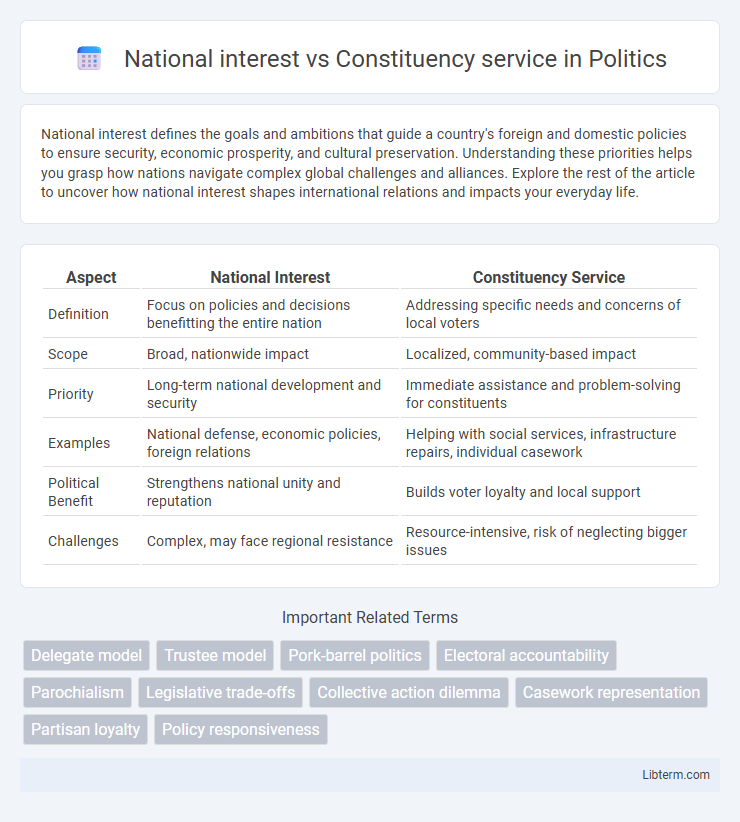National interest defines the goals and ambitions that guide a country's foreign and domestic policies to ensure security, economic prosperity, and cultural preservation. Understanding these priorities helps you grasp how nations navigate complex global challenges and alliances. Explore the rest of the article to uncover how national interest shapes international relations and impacts your everyday life.
Table of Comparison
| Aspect | National Interest | Constituency Service |
|---|---|---|
| Definition | Focus on policies and decisions benefitting the entire nation | Addressing specific needs and concerns of local voters |
| Scope | Broad, nationwide impact | Localized, community-based impact |
| Priority | Long-term national development and security | Immediate assistance and problem-solving for constituents |
| Examples | National defense, economic policies, foreign relations | Helping with social services, infrastructure repairs, individual casework |
| Political Benefit | Strengthens national unity and reputation | Builds voter loyalty and local support |
| Challenges | Complex, may face regional resistance | Resource-intensive, risk of neglecting bigger issues |
Defining National Interest and Constituency Service
National interest refers to the overarching goals and priorities that promote a country's security, economic prosperity, and diplomatic standing on a global scale. Constituency service involves elected officials addressing the specific needs, concerns, and requests of their local voters to secure support and improve their community's well-being. Balancing national interest with constituency service requires aligning broad policy decisions with localized benefits to ensure both effective governance and voter satisfaction.
Historical Perspectives on Political Representation
Historical perspectives on political representation reveal a persistent tension between national interest and constituency service, where legislators balance collective policymaking with localized demands. Early democratic theorists like Edmund Burke emphasized trusteeship, urging representatives to prioritize national welfare over parochial interests. Conversely, the rise of mass democracy in the 19th and 20th centuries intensified the focus on constituency service, reflecting the growing expectation for legislators to address specific voter needs while navigating broader national concerns.
Balancing National Policy and Local Needs
Balancing national policy and local needs requires navigating the tension between advancing overarching national interests and addressing specific constituency concerns. Effective legislators prioritize policies that promote economic growth, security, and social welfare at the national level while simultaneously tailoring solutions to regional infrastructure, healthcare, and education demands. Successful governance depends on harmonizing broader strategic goals with the immediate and diverse needs of local communities.
Challenges Faced by Elected Officials
Elected officials often struggle to balance national interests with constituency service, as local demands may conflict with broader policy goals. This tension complicates legislative decision-making, since prioritizing constituents can undermine national strategies on issues like defense or economic reform. The challenge lies in effectively communicating trade-offs while maintaining voter trust and advancing comprehensive governance.
Case Studies: When Interests Collide
Case studies reveal frequent conflicts between national interest and constituency service, exemplified by politicians prioritizing local projects over broader policy goals. For instance, members of Congress often secure federal funding for district-specific infrastructure, even when national budget constraints demand austerity. This tension underscores the challenge of balancing parochial demands with overarching strategic priorities in democratic governance.
Impact on Legislative Decision-Making
Legislators often balance national interest with constituency service, impacting their decision-making by prioritizing policies that benefit their local voters while considering broader national goals. This dual focus can lead to compromises influencing legislative outcomes, as representatives weigh immediate local concerns against long-term national priorities. Research shows that legislators who effectively integrate constituency needs with national policy objectives tend to garner sustained political support and foster comprehensive legislation.
Voter Expectations and Political Accountability
Voter expectations often create tension between national interest and constituency service, as constituents demand immediate benefits while politicians must balance broader policy goals that serve the entire nation. Political accountability mechanisms compel elected officials to respond to local demands to secure re-election, sometimes at the expense of long-term national priorities. Effective governance requires navigating these competing pressures to align constituency service with national interest without compromising democratic responsibility.
The Role of Party Politics in Representation
Party politics significantly shapes the balance between national interest and constituency service, as elected officials often navigate competing demands to maintain party cohesion while addressing local needs. Political parties prioritize national agendas and policy platforms that can unify diverse constituencies, but representatives must also respond to specific voter concerns to secure electoral support. This dynamic tension influences legislative behavior, where party loyalty sometimes conflicts with direct constituency advocacy, impacting the effectiveness of democratic representation.
Strategies for Harmonizing Conflicting Interests
Balancing national interest with constituency service requires strategies like prioritizing policy initiatives that deliver broad benefits while addressing specific local concerns. Effective communication channels between policymakers and constituents help align public expectations with national goals. Leveraging data-driven decision-making ensures resource allocation harmonizes local demands and overarching national priorities.
Future Trends in Representation and Governance
Future trends in representation and governance emphasize balancing national interest with constituency service through data-driven decision-making and enhanced digital engagement platforms. Emerging technologies like AI-powered analytics enable representatives to align local needs with broader policy goals, fostering more responsive and transparent governance. Increased citizen participation via social media and e-government tools is reshaping how officials prioritize national priorities while addressing constituency demands.
National interest Infographic

 libterm.com
libterm.com